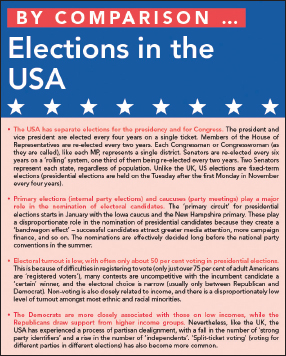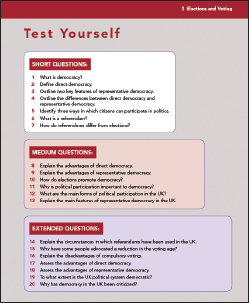
This textbook has been written specifically to meet the needs of students who are studying A and AS-Level Politics. It provides a lively, accessible and comprehensive introduction to the ‘essentials’ of the subject and covers the key topics and themes on the Edexcel and AQA specifications.
THE AS/A-LEVEL SPECIFICATIONS
The new A-Level Politics specifications (for teaching from September 2017 onwards; first examined in 2018 (AS) and 2019 (A-Level)) are composed of three parts:
• Government and Politics in the UK (this can also be studied as a stand-alone AS-Level)
• Political Ideas (in the Edexcel specification, this is assessed in tandem with Government and Politics in the UK)
• Either Global Politics or Government and Politics in the USA (although the AQA specification offers only the latter).
This book supports students who are studying Government and Politics in the UK, and fully covers the subject content of both the Edexcel and the AQA specifications (see below). In addition, it contains ‘bridges’ to other parts of the A-Level specifications, notably the ‘Key ideas’ features (which link to Political Ideas) and the ‘By comparison’ features (which link to Government and Politics in the USA). To ensure that other parts of the A-Level specification are covered in appropriate depth and detail, the present volume has a companion volume – Essentials of Political Ideas.
UK Politics |
|
Subject content |
Essentials of UK Politics |
Introduction to the subject (background to UK politics) |
|
1. Democracy and participation |
|
2. Political parties |
|
3. Electoral systems |
|
4. Voting behaviour and the media |
|
UK Government |
|
1. The constitution |
|
2. Parliament |
|
3. Prime minister and executive |
|
4. Relationship between branches |
Chapter 7 (location of sovereignty) |
AQA GOVERNMENT AND POLITICS OF THE UK |
|
Government of the UK |
|
Subject content |
Essentials of UK Politics |
Introduction to the subject (background to UK politics) |
|
1. The nature and sources of the UK constitution |
|
2. The structure and role of the Parliament |
|
3. The prime minister and cabinet |
|
4. The judiciary |
|
5. Devolution |
|
The Politics of the UK |
|
1. Democracy and participation |
|
2. Elections and referendums |
|
3. Political parties |
|
4. Pressure groups |
|
5. The European Union |
|
The book has a number of features that are designed to aid understanding and to support examination performance. (The boxed features are cross referenced throughout.)
Previews. These appear at the beginning of each chapter, and highlight the key issues that it addresses.
UK politics in action. These focus on a significant event or development from recent years that raises interesting questions about the topic being studied.

Milestones. These provide a timeline of the key dates in significant historical developments, with brief explanations of the events highlighted.

‘Key ideas’ boxes. These provide an account of the major political ideas and key ideological themes that define liberalism, conservatism and socialism, respectively.

Online support. The website associated with this book provides clickable and fully updated weblinks and a searchable glossary of all the on-page definitions. See www.palgravehighered.com/heywood-eukp-4e.
‘Differences between’ boxes. These highlight differences between terms and concepts that are sometimes confused.
‘Focus on’ boxes. These supplement information found in the main text by providing fuller or more detailed explanations of important political processes.
‘Key concepts’ boxes. These provide fuller explanations of significant political ideas and concepts.
On-page definitions. These provide single-sentence definitions of key terms at appropriate points in each chapter. (You can search for defined terms by looking for bold entries in the index. They also appear on the website; see Online support.)

‘By comparison’ boxes. These aim to strengthen the understanding of UK politics by providing comparative information about the USA. (In many topics, explicit comparisons with US politics can help candidates to demonstrate a deeper level of understanding.)

Questions. Appearing at the end of each chapter, these sets of questions of increasing complexity can be used to check your understanding and to help to prepare you for the examination.

‘Debating’ boxes. These provide an overview of the main arguments for and against a particular topic. (One of the important skills that students need to demonstrate is an awareness of competing viewpoints and the ability to evaluate political arguments.)

How can you ensure that your performance in Government and Politics is as good as it can be? How can you ensure exam success? Below are some helpful hints on how you can maximise your performance as you study the subject and as you prepare for the examination.
STUDYING THE SUBJECT
• Keep up to date with current affairs. This will both make the subject more interesting to study (politics never stands still) and give you useful ammunition to use in the examination. Your knowledge needs to be as up-to-date as possible, and examiners are particularly looking to reward contemporary knowledge and understanding. Use websites, read a ‘quality’ newspaper (many of which can be accessed online) and articles in journals such as Politics Review, and watch the news and current affairs programmes on television.
• Understand key terms and concepts. Much of political understanding is based on a grasp of major terms and concepts – democracy, representation, parliamentary sovereignty, civil liberties, and so on. Make sure you have a thorough grasp of these terms, and be sure that you can define and explain them reliably in the examination itself.
• Be aware of competing viewpoints. Just about every issue in politics is the subject of debate and discussion.You need to show an awareness of the different sides of an argument – almost every statement you make in politics could be followed by ‘However…’. But you also need to develop your own views, which means being able to support a particular viewpoint on the basis of evidence – make a point and prove it.
PREPARING FOR THE EXAMINATIONS
• Draw up a revision plan. Revision is seldom done effectively if it is left until ‘the mood takes you’. Draw up a plan of which topics you are going to revise and when – and then stick to it!
• Know your specification inside out. You have an outline from the preceding section, ‘The Specifications’, of the main topics covered in each unit. But the specification itself, as well as supporting materials provided by the awarding body for students, provides you with greater detail, including the identification of key concepts and an outline of the content.
• Be familiar with past papers, marking schemes and examiners’ reports. These are all provided by awarding bodies, and they contain invaluable information about the kind of questions that will come up and the level of performance that will be expected.
• Have as much exam practice as possible. In the run-up to the examination, frequently practise answering examination questions in examination conditions and within examination timescales. If nothing else, this will ensure that you do not get your timings wrong – the silliest of all reasons for poor exam performance.
• Pay attention to ‘command words’ in the questions. These are often the first word used in a question, and each has a specific meaning. You need to know these meanings to ensure that you carry out a ‘right’ task when answering the question. For example:
• Explain – make something comprehensible; this usually involves examining how or why it is the case.
• Analyse – look at something in detail in order to uncover its meaning or essential features.
• Evaluate – make substantiated judgements and draw conclusions about something.
• Discuss – consider something logically; this usually involves assessing rival viewpoints and developing a reasoned argument.
• Compare and contrast – identify similarities and differences between two or more things, and evaluate their respective significance.
• Be aware of what you get marks for. This is spelled out in the three assessment objectives (AOs), which are the same in both specifications. These are:
• AO1: Demonstrate knowledge and understanding of political institutions, processes, concepts, theories and issues.
• AO2: Analyse aspects of politics and political information, including in relation to parallels, connections, similarities and differences.
• AO3: Evaluate aspects of politics or political information, including to construct arguments, make substantiated judgements and draw conclusions.
• Answer the precise question set. The most common reason for exam underperformance is a failure to ‘target’ the question set. Common mistakes include providing a pre-prepared answer to a question from a previous examination, or writing generally about the topic of the question, rather than addressing the particular question itself. To help avoid these mistakes, get in the habit of regularly using the terms from the question in your answers.